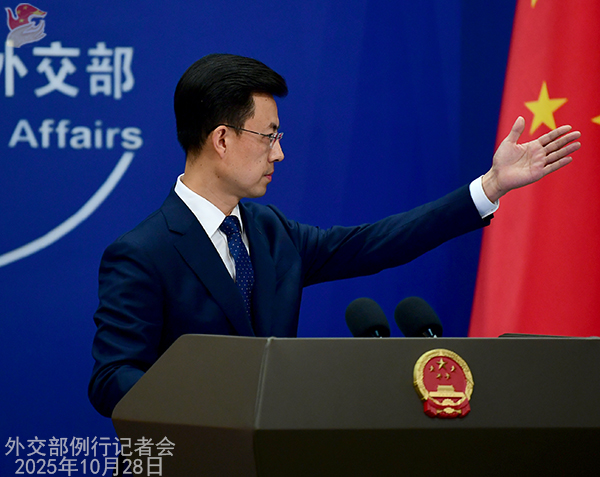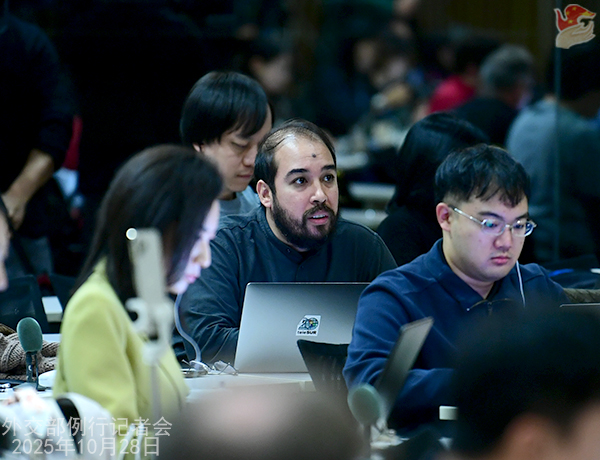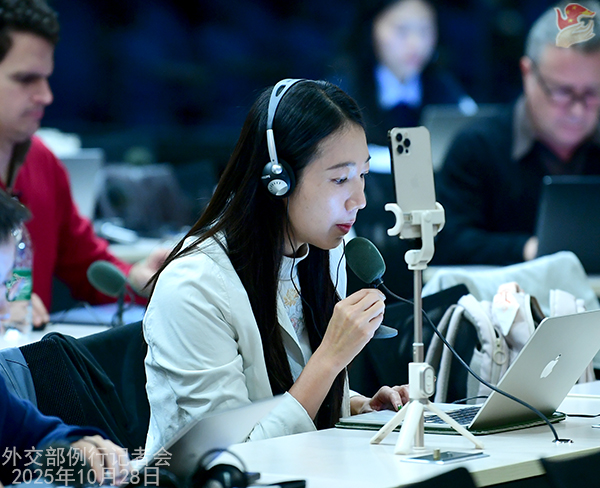
People’s Republic of China


Xinhua News Agency: The leaders’ meetings on East Asian cooperation were successfully held in Kuala Lumpur. Can you share details about Premier Li Qiang’s participation in the meetings and the outcomes and highlights?
Guo Jiakun: From October 27 to 28, Premier Li Qiang attended the leaders’ meetings on East Asian cooperation and the Regional Comprehensive Economic Partnership (RCEP) Summit in Kuala Lumpur. The meetings achieved positive outcomes. Premier Li Qiang congratulated Timor-Leste for officially joining the ASEAN family and witnessed the signing of the China-ASEAN Free Trade Area 3.0 Upgrade Protocol together with Prime Minister Dato’ Seri Anwar Ibrahim of Malaysia, ASEAN’s rotating chair.
At the China-ASEAN Summit, Premier Li Qiang noted that China and ASEAN countries need to stand more firmly for solidarity and strength, pool greater effort, resist external disruptions, defend our legitimate rights and interests through mutual support and coordinated actions, promote steady and sound economic growth through complementary cooperation, consolidate strategic mutual trust, work for deeper convergence of interests, build closer bond, and continue to promote the building of an even closer China-ASEAN community with a shared future. Participating leaders of ASEAN countries noted that the ASEAN-China relationship has set an example of regional cooperation based on mutual respect and for mutual benefit, and expressed the readiness to bring the ASEAN-China comprehensive strategic partnership to a higher level.
At the ASEAN Plus Three Summit, Premier Li Qiang stressed that openness and cooperation is a valuable experience East Asian countries gained and refined through hard work. It must be cherished and upheld. The East Asian miracles are not behind us, but ahead of us as an unfolding reality. China stands ready to work with all parties to seek greater synergy of development strategies, uphold openness and cooperation, continue unleashing economic potential, foster an environment conducive to regional development, deepen collaboration on industrial and supply chains, jointly cultivate new drivers of development and broaden development space. The summit adopted the Statement on Strengthening Regional Economic and Financial Cooperation. Participating leaders noted that amid rising uncertainties in the international situation and trade protectionism, parties need to strengthen solidarity and coordination, have a greater sense of regional community, foster a peaceful and stable environment, uphold the multilateral trading system, stay committed to openness and mutual benefit and work to achieve innovation-driven, inclusive and sustainable development.
At the RCEP Summit, Premier Li Qiang spoke highly of RCEP’s role and implementation results, and pointed out that RCEP parties need to have closer coordination, build a big regional market with a more open mind, improve and upgrade RCEP through more proactive actions, and uphold the multilateral trading system with greater resolve. China stands ready to work with various parties to pool wisdom and strength, strive for more practical outcomes of RCEP cooperation, and jointly create a better future of common prosperity. The summit adopted the Joint Leaders’ Statement. Participating leaders recognized the important role of RCEP as the world’s biggest free trade arrangement and noted that we need to strengthen mechanism building, draw in more members, keep unleashing potential and achieve more substantive outcomes.
AFP: Delegations from the EU and China will meet in Brussels on Thursday for talks on rare earths. What is China’s posture heading into these talks? Is China prepared to ease export controls on rare earths or offer any other concessions?
Guo Jiakun: China-EU economic and trade relations are shaped by their mutual complementarity and are win-win in nature. We hope the EU will honor its commitment of supporting free trade and opposing trade protectionism, and refrain from resorting to restrictive measures. Instead, the EU needs to properly address trade differences through dialogue and consultation, provide an open, transparent and non-discriminatory environment for businesses from all countries, and take concrete actions to uphold the principles of market economy and WTO rules. For anything specific, I’d refer you to competent authorities.
Nippon TV: Japanese and U.S. leaders met for the first time and they had a meeting today. They have confirmed strengthening U.S.-Japan alliance. What is China’s comment?
Guo Jiakun: The Asia-Pacific is a stellar example of peace and development. The growth of bilateral relations and security cooperation between the U.S. and Japan need to be conducive to regional peace and stability, rather than the other way around.
Given Japan’s history of militarist aggression during the last century, Japan’s military and security moves have been closely watched by its Asian neighbors and the international community. This year marks the 80th Anniversary of the victory of the Chinese People’s War of Resistance Against Japanese Aggression and the World Anti-Fascist War. We urge Japan to respect its neighboring countries’ security concerns, deeply reflect on its history of aggression, stick to the path of peaceful development, and earn the trust of its Asian neighbors and the wider international community through concrete actions.
Reuters: Taiwan’s Lin Chia-lung said that he was not worried that U.S. President Donald Trump would “abandon” the island at his upcoming meeting with Chinese leader, and he said “Taiwan-U.S. relations are very stable,” hence why he is not concerned. How does China view this?
Guo Jiakun: Taiwan is an inalienable part of China’s territory. The biggest threat to peace and stability in the Taiwan Strait at present is the separatist activities of “Taiwan independence” forces and the external connivance and support they receive. China firmly opposes any official interaction between the U.S. and China’s Taiwan region in any form. We call on the U.S. to abide by the one-China principle and the three China-U.S. joint communiqués and exercise extra prudence regarding the Taiwan question. The DPP authorities continues to seek foreign support for “Taiwan independence” and use all kinds of platforms to peddle separatist narratives, spread disinformation and mislead the public. Their moves are rather disgraceful and bound to fail. Nothing the DPP authorities say or do will ever change the historical and legal fact that Taiwan is part of China’s territory, still less the inevitability of China’s reunification.
China News Service: Recently, ten former leaders from Caribbean Community (CARICOM) member states, including former Prime Minister Patterson of Jamaica and former President Ramotar of Guyana, issued a joint statement expressing deep concern over military operations by a certain country in the Caribbean Sea. They reaffirmed the region’s status as a Zone of Peace for over 50 years, and pointed out that the United States should combat drug trafficking within the framework of the rule of law, rather than greenlighting extrajudicial executions. Prior to this, experts of the Human Rights Council’s Special Procedures and Caribbean media commentators also argued that U.S. military actions constitute the crime of extrajudicial execution. What is China’s comment on this?
Guo Jiakun: We noted relevant statement. We hope that the U.S. side will listen to the strong call of Caribbean nations and the international community, cease actions that undermine the peace and stability of the Caribbean region, and return to the path of conducting normal law enforcement and judicial cooperation within bilateral and multilateral legal frameworks.
Brasil de Fato: On Sunday, U.S. Treasury Secretary Scott Bessent said in an interview that China “never imposed” rare earth export controls and he also implied that the threat to impose 100 percent tariffs on China made by President Trump played a role in the negotiations. Did the Chinese government suspend or is it planning to suspend these rare earths export controls? Did the U.S. tariff threats influence the discussions in Kuala Lumpur as Scott Bessent implied?
Guo Jiakun: For anything specific, I’d refer you to competent authorities. On the policy of rare earth export controls, China has made its position clear on multiple occasions. Our measures aim to standardize and refine the export control system, which is in line with common practices. China does so in order to better maintain world peace and regional stability and to fulfill non-proliferation and other international obligations. We stand ready to work with the rest of the world to step up export control dialogue and exchange, so as to better keep global industrial and supply chains secure and stable. On the China-US economic and trade consultation, China has released a readout, which you may refer to.

Reuters: The first direct flight between China and India in more than five years landed in Guangzhou on Monday, in the sign of improving bilateral ties. Would the Foreign Ministry say that other aspects of China-India relations remain “frozen?” Chinese media said that China is essentially “unilaterally opening up” to India. Is that an accurate assessment?
Guo Jiakun: We generally do not respond to media comments or interpretations. The resumption of direct flights between the Chinese mainland and India represents a latest progress in the two sides’ faithful implementation on the important common understandings reached between the leaders of the two countries in Tianjin. It is also an active move that facilitates the friendly exchanges of over 2.8 billion Chinese and Indian people. China stands ready to work with India to view and handle bilateral relations from a strategic and long-term perspective, and move forward relations on a sustained, sound and steady track so as to deliver more tangibly for the two countries and peoples and make greater contributions to upholding peace and prosperity in Asia and beyond.
BBC: About the ongoing controversy in Britain regarding these so-called spies who have been accused of providing information to China which has been leaked from the British government, Is the Chinese government worried that this is harming the relations between China and the UK and possibly souring China’s reputation with people in Britain?
Guo Jiakun: China has repeatedly stated its position on relevant issues. We firmly oppose spreading disinformation about so-called “Chinese spy activities” and vilifying and smearing China.
Regarding China-UK relations, China’s position on developing bilateral ties is consistent. The basis of developing China-UK relations is mutual respect, and efforts to advance cooperation are mutually beneficial in nature. The UK should correctly view this. Some individuals are bent on peddling the “China threat” narrative and viewing cooperation as a zero-sum game. If the UK allows anti-China forces to oppose everything related to China and make reckless provocations, it will only backfire.
Brasil de Fato: Yesterday in Kuala Lumpur, Brazilian President Lula said that he supports Malaysia’s aspiration to become a full member of BRICS. Does China share President Lula’s position and support Malaysia’s bid for full BRICS membership?
Guo Jiakun: BRICS is an important platform for cooperation among emerging economies and developing countries and source of strong impetus for multipolarity and greater democracy in international relations. The platform is widely recognized by Global South countries. BRICS countries value Global South partners’ positive willingness to join BRICS cooperation. We welcome Malaysia and more like-minded partners to join BRICS cooperation and jointly work for a more just and equitable international order.
Beijing Youth Daily: Executive Secretary Robert Floyd of the Provisional Technical Secretariat of the Preparatory Commission for the Comprehensive Nuclear-Test-Ban Treaty (CTBT)Organization (hereinafter referred to as the Treaty) stated on social media that 2026 marks the 30th anniversary of the Treaty. China signed the Treaty on the very first day it opened for signature and has actively advanced work such as the certification of international monitoring stations. China’s initiation of the certification process for two auxiliary seismic stations demonstrates its commitment to multilateralism and its dedication to global peace and security. What is China’s comment on this?
Guo Jiakun: At the invitation of China, Executive Secretary Robert Floyd visited China from October 20 to 25. During the visit, he met with officials from the Ministry of Foreign Affairs, the Ministry of National Defense, the China Earthquake Administration, and local governments. He also attended the launch ceremony for the certification and acceptance of the auxiliary seismic stations in Xi’an and Shanghai, and presented the certification for the Kunming infrasound station.
As one of the first signatories to the Treaty, China has participated fully in the work of the Preparatory Commission and steadily advanced preparations for the implementation of the Treaty. In recent years, China and the Provisional Technical Secretariat have achieved significant cooperation outcomes in areas such as promoting the certification and acceptance of monitoring stations and enhancing capacity building for developing countries. This demonstrates China’s consistent stance of earnestly fulfilling its international obligations and firmly supporting the Treaty.
As a permanent member of the UN Security Council and a responsible nuclear-weapon state, China is committed to peaceful development and follows a policy of “no first use” of nuclear weapons and a nuclear strategy that focuses on self-defense. China always keeps its nuclear strength at the minimum level required by national security. China has faithfully honored its moratorium on nuclear testing. We will work with all parties to uphold the authority of the Treaty and safeguard the international nuclear disarmament and non-proliferation regime.
AFP: Just one quick follow-up to the meeting between Donald Trump and the Japanese Prime Minister, they also said they signed an agreement on cooperation on rare earths securing the supply of them. Does China have any comment on this specific part of their agreement?
Guo Jiakun: We just answered relevant questions.




